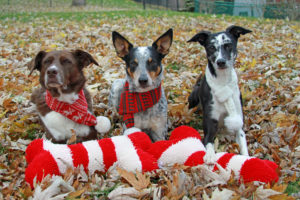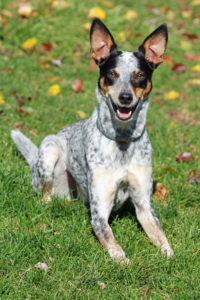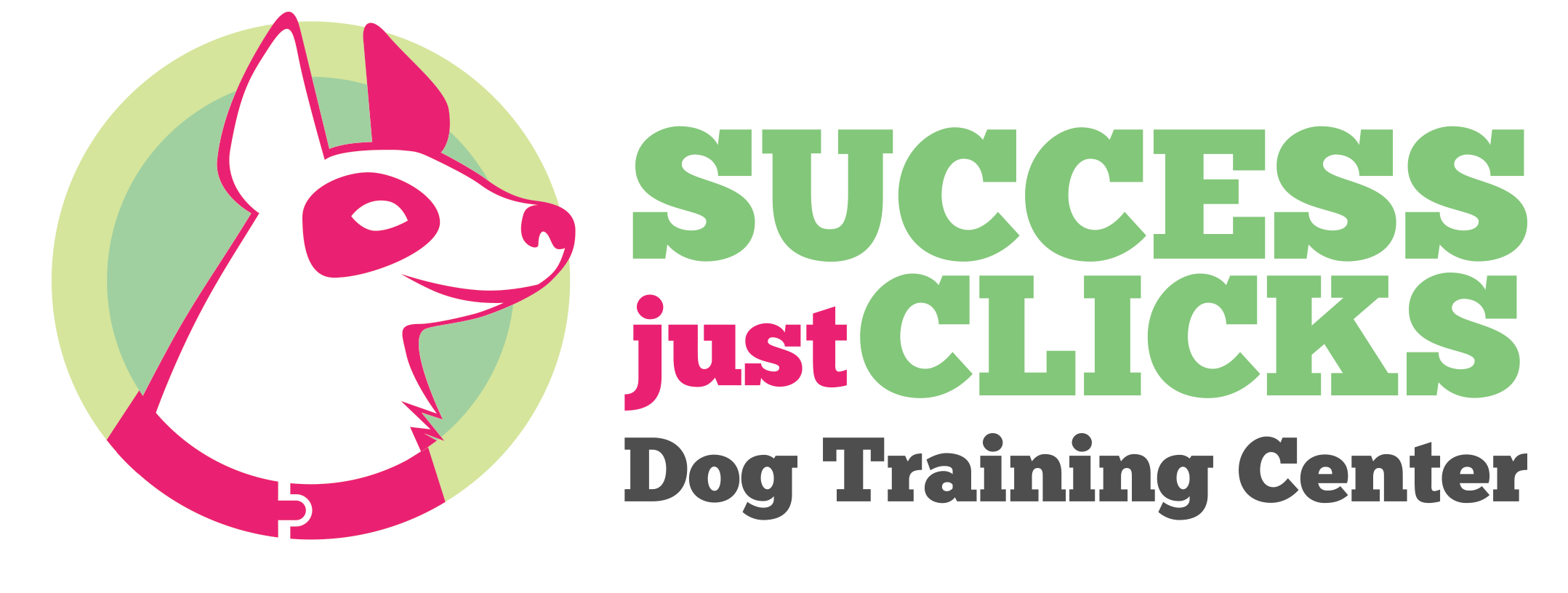Unlikely Allies
How responsible rescue and responsible breeders could work together to improve the state of dogs and the shelter system

Shayne–from a shelter, Rio–from a rescue, Oswin–from an ethical breeder
Go ahead and get your gasps, shouts of “blasphemy,” and freak outs out of the way, I’ll wait…
…
…
…
Okay, now that that’s over with, let’s talk about a radical idea that could benefit all dogs! What if, and hang with me for a minute (okay, a long post), responsible rescues/shelters and responsible breeders could work together to educate the public and support one another? It sounds like a crazy scheme, but if you give me just a few minutes of your time I think it could make some sense!
If nearly all people only got their dogs from either a responsible rescue/shelter or a responsible breeder, I firmly believe we would improve the shelter/rescue situation in this country, and in turn improve the lives of dogs.
I will preface this by saying that many responsible breeders are already involved with and/or support responsible sheltering and rescue. So kudos to the responsible breeders out there who are already actively involved with rescue/sheltering or who support them.
Also, to be clear before continuing, there is a very big difference between a “breeder” and a responsible/ethical breeder and a very big difference between a “shelter/rescue” and a responsible/ethical shelter/rescue. An ethical breeder is not contributing to the shelter/rescue population in any significant manner and responsible rescues/shelters are not making their jobs harder by getting dogs back or passing them (or offspring) off on other organizations.
Here are a few blog posts I’ve written over the years about responsible rescues and responsible breeders: Not All Rescues are Responsible, Rescue Responsibly, and Adopt Don’t Shop… or Else! (evaluating breeders).

Oswin playing on a wobble board at her breeder’s home! Her breeder follows our adventures on FB and encourages us to keep in touch!
Responsible Rescues/Shelters and Responsible Breeders are far more alike than they are different
At the heart of it, all of these players want to see their dogs end up in safe homes, live fulfilling lives, and provide countless years of joy to their new family. The want their dogs to end up in their “furever’ homes where they will remain for the rest of their lives and not end up [back] in a shelter/rescue. They provide people with loving dogs as companions, training partners, or competitive teammates.
Responsible rescues/shelters and responsible breeders follow practices that do not significantly contribute to shelter pet population. They place their dogs in properly screened homes, they temperament test the dogs/puppies to learn more about each of them so they have an idea of what type of family would be ideal, they match families with the right dog for their home/situation/plans, they do not place a dog in a home that is not likely to be a good fit, they either spay/neuter before placing or they place non-breeding quality puppies with a sterilization agreement, and they will always take back a dog they have placed so it doesn’t get surrendered at a [new] shelter/rescue.
Responsible rescues/shelters and responsible breeders absolutely love the dogs in their care and forever love the dogs who have since been placed into their permanent homes. I have been the tearful foster parent saying goodbye to a foster dog and who gets so excited for the periodic updates. I have seen the tears as a breeder says goodbye to the puppy they have potentially spent years planning, 60 days waiting for while caring for a pregnant female they love, and 8 weeks raising and socializing. I recently witnessed the heartbreak of a breeder when a tragic accident, while in their forever home, took the life of one of their “puppies” and the support they have provided to their heartbroken puppy owner.
What can be done to help address and resolve the strains on the shelter/rescue system?
There is no one fix, but there are things that if done together could help to fix the problem from the ground up, not just put a bandaid on it.
*Responsible Rescues/Shelters remove roadblocks to adoption–within reason, creating guidelines rather than hard and fast rules for adoption could open the doors up to quality homes. Instead of a hard and fast rule that you will not adopt any dog to a family with children under 6, how about consider the individual dog–this dog should not go to a home with children under 6, but this other dog could. Or consider the individual adopter–my application to adopt from two different rescues was denied because at the time I lived in an apartment with no fenced in yard. Both rescues failed to consider me as an individual and recognize that I already had a herding dog in that environment successfully and, since I was looking for a dog to be my dog-sport partner, that the dog would absolutely be getting ample exercise and training. If they had looked at me as a well-educated and experienced dog owner, one of those puppies could have had an awesome life (just ask Rio who I ultimately adopted) and had a life-long job!
*Educate the public on responsible breeding–people are going to want to get dogs from breeders–whether because they are looking for a specific breed of dog, want a dog bred for a specific job, want a puppy with a known history, or just want to go to breeder because they’ve always gone to a breeder. If the public knew how to identify a responsible breeder, they would at least be better equipped to make the responsible choice to support a breeder who is not contributing to the shelter population (admittedly, John Q. Public having the ethics and moral compass to follow through with the process of going to a responsible breeder is an entirely different story and one that is certainly a wild card in this game)–for more information on how some irresponsible breeders contribute to the shelter strain, check out this blog, also linked above.
*Drop the “Adopt Don’t Shop” campaigns–When the shelter/rescue community lumps all breeders in the same pile and attacks them, they are furthering the divide and pushing people to assume all breeders are the same, and that is definitely not the case. When the general public thinks all breeders are the same, it doesn’t matter to them if they go to a puppy mill (why go through the effort to find a responsible breeder if they are all the same?). Also, this type of campaign won’t get someone, who is intent on going to a breeder, to adopt from a shelter/rescue–you cannot shame someone into adopting. Shelters/rescues do not have to suggest breeders but being able to educate the community about finding an ethical one would help their cause–puppies from ethical breeders rarely find their way into shelters and when they do, those breeders go above and beyond to get the dogs out. So if a person is intent on getting a dog from a breeder, let’s help them learn how to identify responsible ones to support instead of the pet store down the street, the amish farm in Lancaster, PA, or the unethical backyard breeder in the newspaper or on Craigslist.
What can responsible rescues/shelters/breeders do specifically to help?
*Stop demonizing the “other”–I will be honest here, in my experiences this is mostly from the shelter/rescue world demonizing all breeders (it’s not necessarily shelters/rescues themselves but their supporters). Yes, work to shut down and educate people on puppy mills, irresponsible breeders, backyard breeders, etc.–those are absolutely important tasks, but demonizing all breeders is counterproductive.
*Educate the public about the existence of ethical/responsible breeders/shelters/rescues–When people learn of a ‘good’ brand, they seek that out, when all things are seen as the same, they take whichever is most convenient or cheapest–there are certain products that people have no problems buying an “off brand” or from a discount store but other products that they will absolutely seek out that specific brand or specific store because they know the quality is indeed better. If it is known that there is a superior product/brand, people will bypass the others to find that good one… the same could be done here. Instead of lumping ALL breeders together or ALL rescues/shelters together, let’s highlight features of GOOD ones so people know what to look for to get the best! Let people know that there are some responsible breeders/rescues/shelters that have superior “products” and people will seek them out.

If it had been possible, I would have loved to get another dog JUST like Rio. For that to happen, I opted to find an ethical breeder of a type of dog similar to Rio, being bred for sports/a job.
*Educate, don’t judge!–I have volunteered with a local breed-specific rescue at various events at their booth and I have definitely had John Q. Public approach because they have the same breed and talk to me about loving their dog so much, wanting to breed their dog, or how they are looking for a puppy from a breeder. Instead of flaming them and shaming them, take the time to educate them in a non-judgmental way. Discuss the value of adopting from a rescue/shelter if they are looking for a puppy or adult but recognize that someone intent on purchasing from a breeder will likely do that and your best option is to educate them on finding a responsible/ethical one! If someone is intent on breeding their own dog you can try to guide them to reconsider that decision by providing information, not judgement. Ask lots of questions that allow you to then help educate them on what it takes to be a good breeder:
- “Aww, what are you hoping to achieve through this breeding? Do you already have homes lined up and deposits taken from puppy buyers?”–Oh you don’t know what you hope to achieve, or you just want a puppy, well, there are lots of puppies looking for homes in responsible shelters/rescues. You don’t have homes lined up already? What will you do if you can’t find homes for all the puppies?
- “Oh wow, is your dog a champion in the breed ring? Do they compete in a dog sport? Is your dog a working dog?”– Oh they don’t, well, I think it’s really important if choosing to breed a dog that both parents have titles to show they are good examples of the breed or they are physically and mentally sound enough to compete in a dog sport or have a job successfully.
- “Have you done OFA, PENNHIP, DNA, or [other applicable tests for the breed if you know them]. Is your dog a carrier for CEA [or other applicable genetic malady]”–Oh, you haven’t? How do you know if your dog won’t pass on something like hip dysplasia, heart conditions, predisposition to diseases, etc? Since not all of these things show up in the parent, but can be carried by a parent. Here’s some information on where you could look up breed appropriate health tests that are recommended before breeding.
- “Are you worried about what happens if things go wrong?”–I’d love to have another dog like the one I have and love so much, but I don’t think I could handle if something went wrong. Beyond the high cost of vetting a healthy mom and a healthy large litter, if something would happen to go wrong and she or one/some of the pups needs emergency or extensive vet care I would hate to see the costs add up. I also don’t think I could handle the risk of the dog I love so much dying or having a litter of stillborn puppies, I just don’t think I could do it.
*Use referrals frequently–If a breeder doesn’t have a puppy who matches the need of a prospective family, refer them to another responsible breeder, send them to breed specific rescue, or suggest they may find just what they are looking for at a responsible rescue/shelter that you know of. If a shelter/rescue doesn’t have a good match for a family, refer them to another responsible rescue/shelter locally and provide them with information regarding the inflow of your shelter/rescue and that new dogs are coming in all the time and to check back frequently. If a family was specifically searching for a puppy and didn’t find a good match, I’d provide the aforementioned information and would seriously consider providing information on identifying a GOOD breeder (and avoiding puppy mills/pet stores) if they seemed a bit impatient or likely to “just go to the pet store.” What happens more often than I think people realize is that if a dog/puppy cannot be easily found at a shelter/rescue, the family will go to another sure-fire place like a pet store or backyard breeder to get the dog.
So there you have it, my radical idea of how, with a little bit of thinking outside the box, we might be able to help improve the shelter/rescue situation, improve the lives of dogs, and start to take on the horrific puppy mills and unethical pet stores that sell dogs from questionable sources! If people simply knew where to go to support responsible rescue/shelter/breeders the others would lose money and hopefully end up out of business (and in turn slow down the flow of unwanted dogs into shelter/rescue–and with fewer intakes, shelters can focus their resources on helping the dogs they have).
